Cracking the glass ceiling at Ottawa city hall
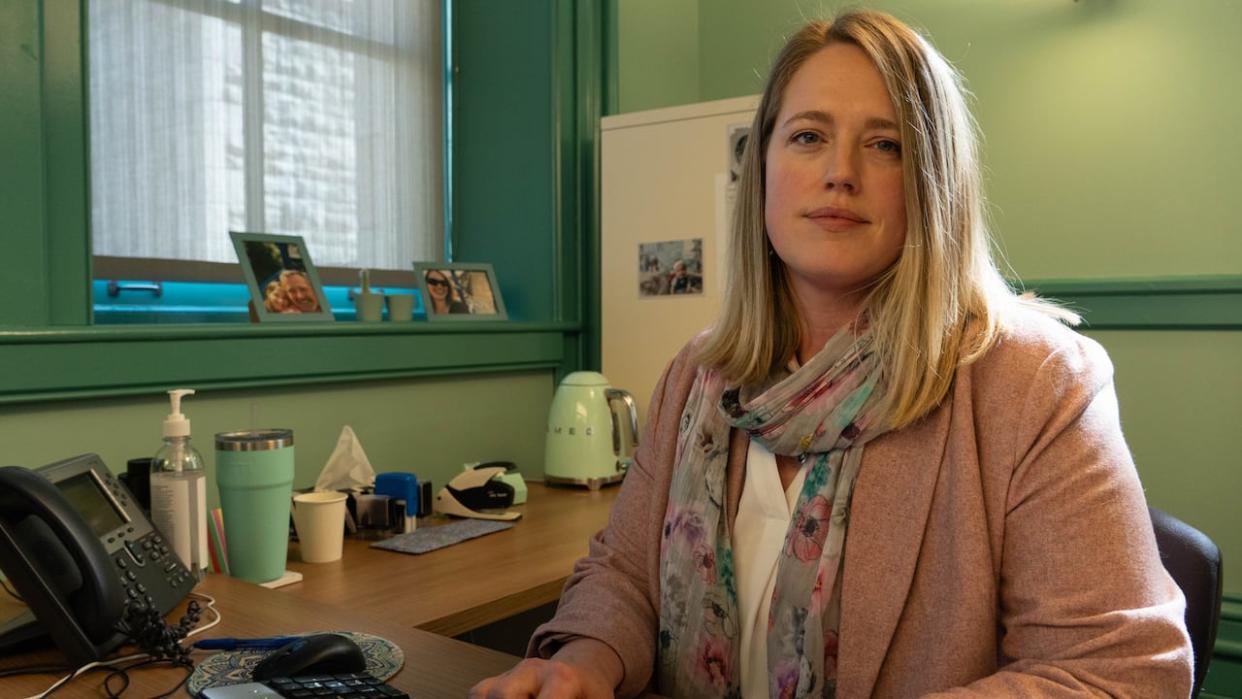
Caitlin Salter MacDonald is on camera weekly sitting just in front of Mayor Mark Sutcliffe, but the spotlight is rarely on her — and that's just the way she likes it.
"Once I realized there was a role where I could be around politics, but not be political … that really resonated with me," she said from her tidy corner office.
One look at her colour-coordinated desk accessories will tell you she's the kind of person you'd want to be keeping the city hall agendas organized, and councillors informed of the rules.
"I see the role of city clerk as helping create the conditions for council to make the best decisions on behalf of the City of Ottawa," she explained.
When Salter MacDonald was named successor to longtime clerk Rick O'Connor on Wednesday, she became a member of Ottawa's senior management and tipped the scales toward gender parity.
She's joining four other women near the top of the city's organizational chart — three of them permanent and one interim— just below Ottawa's first female city manager Wendy Stephanson.
"I'm really proud of that, actually," Stephanson told CBC by phone. "You need different voices around the table."
While more women are finally climbing to the top of the corporate ladder, she said there's also a greater proportion of female supervisors at all levels. Women represent 54 per cent of the city's managers, carrying on a workforce trend that spans the past three consecutive years.
On the occasion of International Women's Day, CBC spoke to four of those at the top about the gradual shift in culture that's allowed them to reach this milestone, and the challenges that remain.
Breaking up the wall of suits
When looked at over the course of decades, Salter MacDonald says the changes at city hall are stark.
Her first job at the city — apart from her time as a lifeguard — was in the clerk's office, an atmosphere she found welcoming almost immediately.
But the committee rooms showed how far the city still had to go.
"I would sort of look up at the staff presentation table and see a bunch of older gentlemen in suits, and I couldn't tell them apart," she said, joking that the obvious sameness made taking minutes "very difficult."
Outside the halls of municipal government, a similar story unfolded for a young Tammy Rose.
The trained engineer recalled how challenging it was to come up in a male-dominated field, particularly during her time working in the private sector.
"There was an old-boys club back then," she said, remembering the questions she heard most often while networking: "Do you golf? Do you ski? Do you play hockey?"
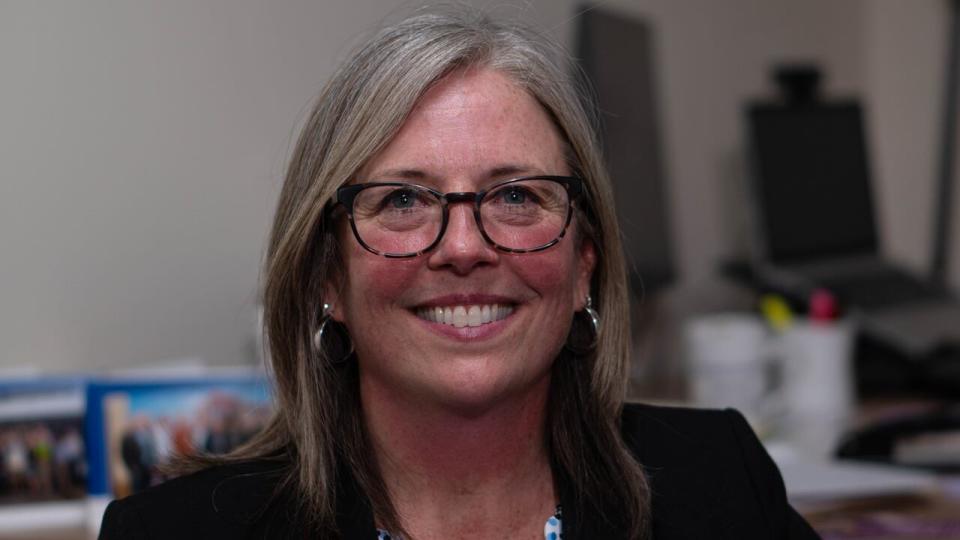
Tammy Rose oversees $72 billion in city assets through her job overseeing the infrastructure and water services department. But she says that she struggled as a young woman with 'imposter syndrome.' (Jean Delisle/CBC)
As a woman, she had to find more creative ways to make professional connections.
"I don't think I knew what I was doing," she said. "But it was something I had to do differently that my male colleagues didn't have to do."
Her hard work and perseverance has led to a long tenure at the city, culminating in her current role overseeing the infrastructure and water services department — and $72 billion of municipal assets.
Fighting 'imposter syndrome'
Another engineer-turned-manager is Renée Amilcar, who moved to Ottawa from Montreal after the troubled opening for Ottawa's new light rail transit system.
Her striking canary yellow jacket sets off the red of the OC Transpo logo that emblazons her office wall and represents her self-described passion for public transit.
It hasn't always loved her back.
"At the beginning it was tough, you know, because the media are tough on us," she said in a nod to the LRT's technical hurdles and her department's financial challenges.
"Now, my people are trying to just embrace the good news," she said. "We can enjoy and welcome those little wins instead of crying in the corner because this reporter was not nice."
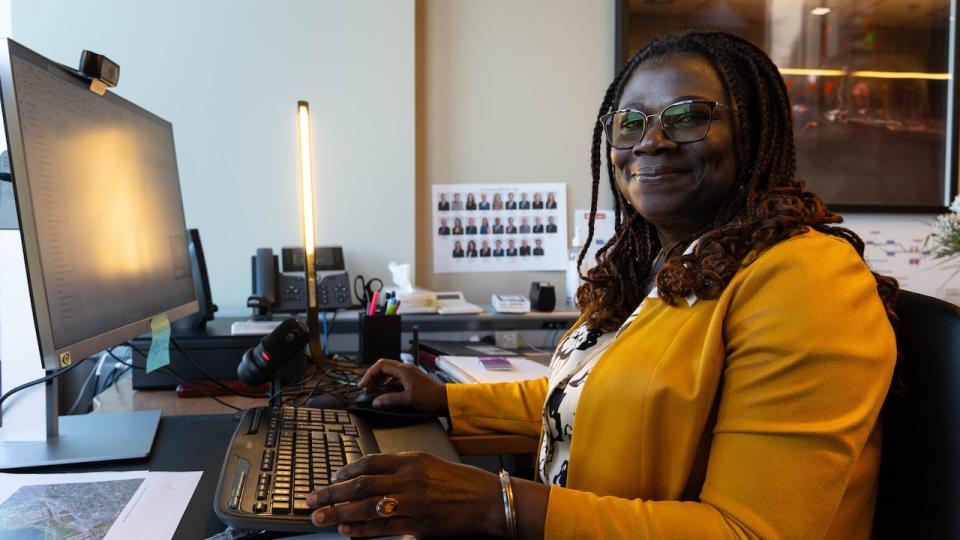
Renée Amilcar, general manager of transit services, says the public criticism her team endures makes supporting them one of her most important duties. (Jean Delisle/CBC)
The challenges have made her fiercely protective of her team, and toughened her skin. But that comes naturally to women in competitive fields, she said.
"Just because we are women, it's like we feel we have to be better — not good, better," she said. "It's unfortunate. It's still the reality."
Amilcar said having a role model at work can help relieve some of the pressure women put on themselves.
The women who spoke to CBC all said they'd like to tell their younger selves to ignore their "imposter syndrome" and trust in their abilities as much as their male peers clearly did.
"I've heard it's a common experience for women to not feel they're qualified to do something unless they tick every box," Salter MacDonald said.
"I really had encouragement to push myself and give things a shot, and that has really helped me over the years."
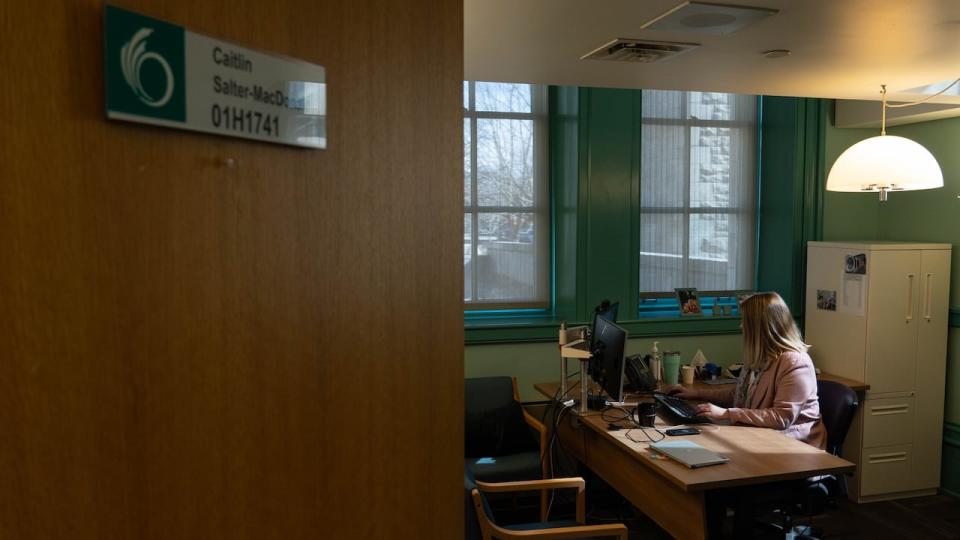
Caitlin Salter MacDonald, Ottawa's city clerk, says her door is always open to young female public servants looking for career advice. (Jean Delisle/CBC)
Compensation is 'key,' says city manager
That boost of self-confidence is more than a psychological aid. It can help women secure equal opportunities to men, including financial ones.
The province's most recent Sunshine List, a regularly disclosed list of public servants earning more than $100,000 per year, showed nine of Ottawa's most highly paid employees in 2022 were women.
Five years earlier, that figure was six. Six years earlier, it was three.
CBC looked at the top 500 employees on the list — which includes nearly 300 people employed by the still male-dominated paramedic and firefighter departments — and calculated that roughly 22 per cent were women.
It's double what CBC found in a similar search back when the 2017 list was announced.
Take out emergency services personnel and the number jumps to above 40 per cent, well above the 25 per cent a half decade prior.
"Compensation is key," Stephanson said. "We've made strides in terms of ... where things were and where we've come. As we move into the future and you look at hiring processes and applying that diversity and equity lens on our policies, you're going to see that continual shift."
Shifting the culture at the city
There's another factor that's harder to quantify: workplace culture.
The managers agreed having a supportive and enjoyable environment is a surefire way to attract and retain top female talent.
Stephenson said she often recalls conducting interviews in a male-dominated workplace, and a man suggested her place was in the home.
A different but equally impactful incident has been following Rose around for decades. Early in her career, she was in a meeting with two male colleagues who commented on her recent weight loss.
"I could see the eye movement, like they were looking up and down and appreciating the weight loss. And I felt so uncomfortable," she explained.
After some initial attempts to call human resources ended with her nervously hanging up, she found the courage to file a complaint and was satisfied with an apology from the men who had made her feel such discomfort.
"I think it was done innocently. I don't think they were doing it maliciously," she said. "But thankfully, there's been an evolution since that time, too."
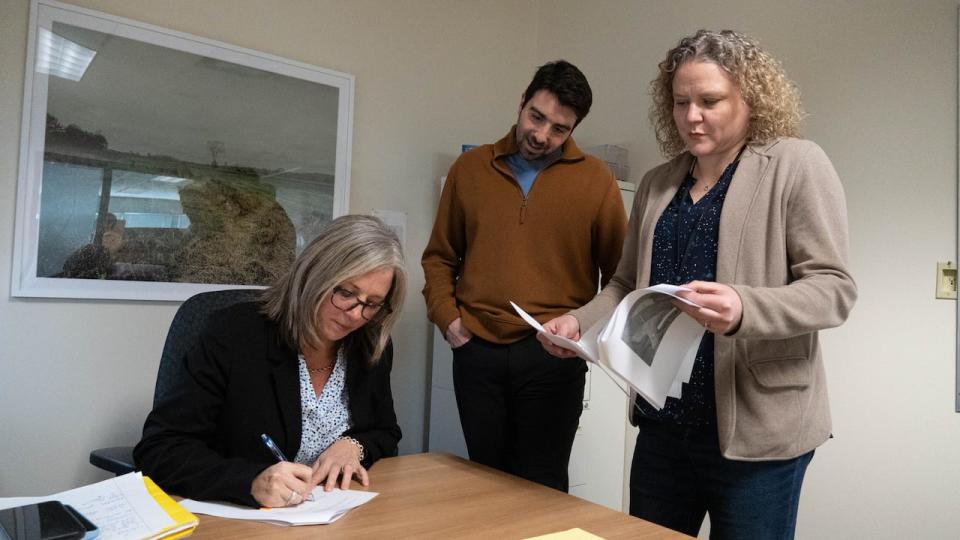
Tammy Rose, seated, general manager of infrastructure and water services at the city of Ottawa, with employees Dylan Samuel and Lisa Petch. (Jean Delisle/CBC)
A safe space to speak up
While Rose had to reach back more than 30 years to find that anecdote, the city has been no stranger to harassment in recent years — though the most public example happened within councillors' offices.
The integrity commissioner produced several scathing reports outlining the "incomprehensible incidents" committed by former councillor Rick Chiarelli.
Within the bureaucracy, Rose said there was "utter disbelief."
The shocking revelations underscored the need to create an environment where women who face harassment feel comfortable enough to speak out.
"We have to show up, be responsive, support them and also address that behaviour," Rose said.
Next step is broadening the tent
For Amilcar, there's a simple ingredient that can't be overlooked: Having a workforce that reflects the diversity of the city it serves helps build the confidence staff need to upset the balance of management when necessary.
Just two weeks ago, she met with the first Black woman to ever drive one of OC Transpo's red and white buses.
"Because of you, I am here," Amilcar remembers telling her. "You prepared everything for me, and now I can have this position."

From left to right, Amilcar, transit commission chair Coun. Glen Gower and Mayor Mark Sutcliffe pose for a photo on an OC Transpo bus in September 2023. (Melanie Campeau/CBC)
The OC Transpo chief said she has the freedom to proudly talk about being a Black woman who emigrated from Haiti at the age of 11, and sacrificed time with her daughter — now studying cell biology at university — to focus on her career.
It wasn't always that way. That first female bus driver told her discussing her ethnicity felt taboo.
That shift toward empowering women with more diverse backgrounds is where the city needs to go next, agreed Salter MacDonald.
"I think we need to broaden the tent," she said. "Being intentional as leaders to reach out to support those who are not like us is important and is really the next step in changing that culture."
As for whether city hall has shattered its glass ceiling, Amilcar says no — not until women no longer feel pressure to devote their entire selves to the job.
But the cracks are starting to spread.


